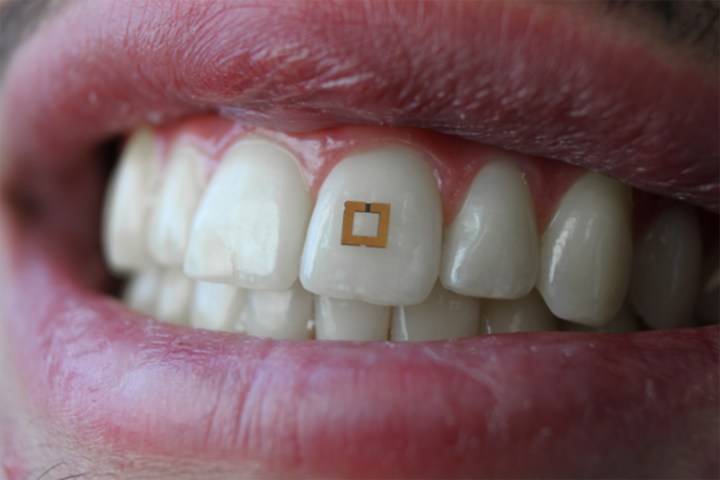High-tech wearables are everywhere, from our wrists to our pets to our … mouths?
Engineers at Tufts University have created tiny sensors that attach to teeth. It’s not a fashion statement, though it could very well someday become one. Instead, the wireless sensors are designed to monitor health and dietary habits, relaying data about sugar, salt, and alcohol intake to a wearer’s mobile device. It’s like a little nutritionist in your mouth that keeps tabs on every time you cheat on your diet.
If the eyes are windows to the soul, the mouth is a doorway to our health. The food that passes through it has a direct effect on our overall health, and a bunch of biomarkers can be picked up from our spit. With their tooth-mounted biosensor, the Tufts team aims to take measurements from inside the mouth, recording what’s been eaten and how the body has responded.
To do so, they sandwiched biosensors between layers of gold, which act like a little antenna, collecting and relaying physiological data.
“I think the best way to think about it is a little Ziploc bag,” Fiorenzo Omenetto, a Tufts engineer who led the research, told Digital Trends. “Each side of the bag has an antenna and inside the bag there is a “sensitive element.'” These sensitive elements can respond to things like pH and glucose, transmitting measurements either wirelessly, through radio frequencies, or physically, for example by changing color and shape. “Calibrating all of these responses and changing material combinations allows for detection of what is happening in the oral cavity, for example, or on the surface of teeth,” Omenetto said.
In a paper published last week in the journal Advanced Materials, the researchers discuss how the tooth-mounted wearable could be used for both medical and lifestyle purposes, helping both patients and people who just want to live healthier.
“While we are aware about what we ingest, we may indulge or deal with overeating pathologies,” Omenetto said. “On the other hand, sampling and monitoring analytes in the oral cavity could help in a number of ways, from monitoring dental health to monitoring physiological states, such as fatigue, through saliva sampling. Obviously, the latter applications require device refinements in terms of sensitivity and specificity to the analytes of interest.”
The device is less obtrusive than previous in-mouth wearables, but it’s still far from discreet, thanks to gold outer layers that give wearers the look of a cyberpunk pirate. Omenetto admits he and his team didn’t design it to be inconspicuous, but said you could always wear it on a molar.



